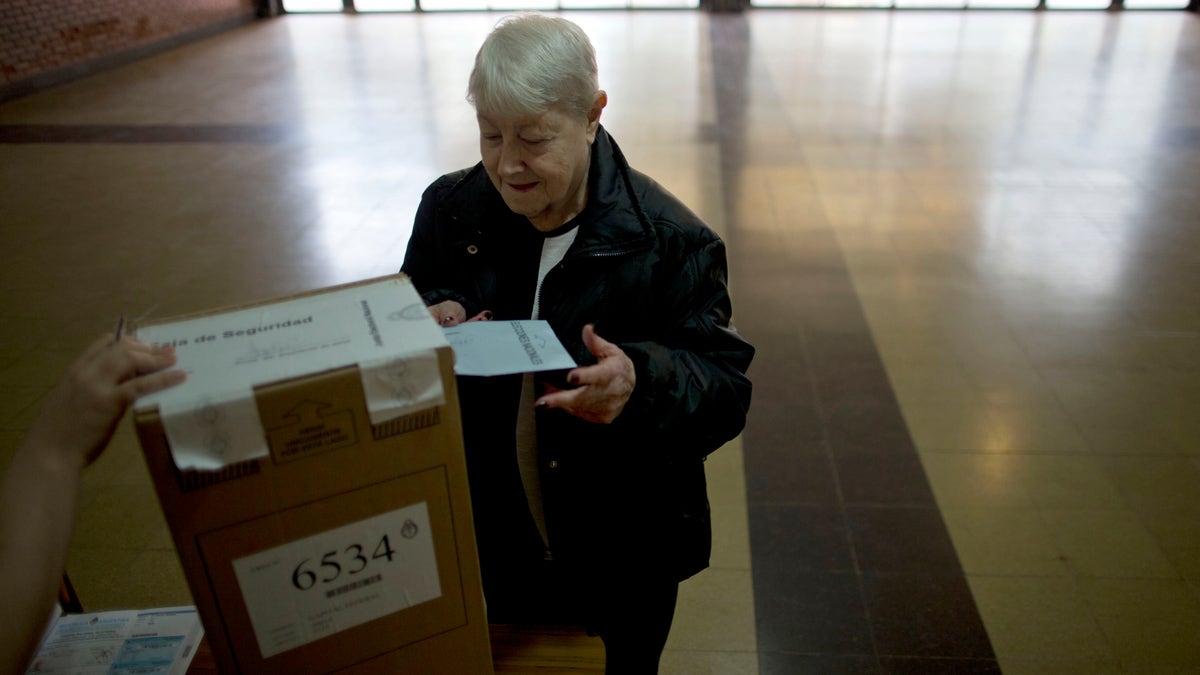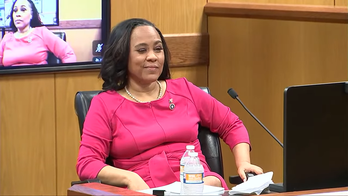
A woman casts her vote during open primary elections for presidential candidates in Buenos Aires, Argentina, Sunday, Aug. 9, 2015. The voters will decide presidential candidates in their respective parties ahead of the Oct. 25, 2015 general elections. (AP Photo/Natacha Pisarenko)
BUENOS AIRES, Argentina (AP) – Millions of voters in Argentina braved rains on Sunday to weigh in on what the South American nation should look like after the departure of President Cristina Fernandez, who along with her late husband guided the country for 12 years with social welfare policies aimed at the poor while often employing combative rhetoric and protectionist policies with other nations.
Voters were casting ballots in open primaries for presidential candidates who have all but sealed the nominations in their respective parties, making the exercise essentially a giant national poll ahead of the Oct. 25 elections.
The nation known for its soccer players, tango dancing and choice beef is struggling with myriad economic problems. Independent analysts put inflation at over 30 percent and the Argentine peso has slid sharply against the American dollar in recent months. A long-standing dispute with U.S. hedge funds that Fernandez calls "vultures" has kept foreign investors away.
Polls show voters deeply divided about how, and who, is best to tackle those issues.
"We need improvements in every area of life," said Hector Ramirez, a 65-year-old doorman, who said he was still undecided as he waited in line to vote at an elementary school. "Argentina is a glorious country with abundant resources. The problem has always been who is governing."
The primaries will help the top candidates judge how their campaigns are faring ahead of the general elections — in particular how closely to align their platforms to the social welfare policies of Fernandez's political movement, known as Kirchnerismo.
Daniel Scioli, the governor of the Buenos Aires province and a former vice president, is Fernandez's successor candidate. He has praised her policies but also promised to make reforms where necessary and be more amicable in dealings with other countries.
Mauricio Macri, the former mayor of Buenos Aires and ex-president of the popular Boca Junior soccer club, is the top opposition candidate. He has promised to make the country more business friendly and immediately lift all restrictions on citizens' ability to buy U.S. dollars — a promise the government and some economists say isn't realistic.
Meanwhile, Sergio Massa, who has held cabinet and elective posts and broke with Fernandez, is running on his own ticket and promises to jail corrupt politicians. His bid is a longshot, though he has enough support to be a spoiler or kingmaker in the general election.
Scioli has led the pack in the polls for several months, and was up by as many as 10 points over Macri in the most recent surveys.
Fernandez is constitutionally barred from running for a third term. Fernandez's late husband and predecessor, Nestor Kirchner, was elected in 2003 and served one term before she ran. The couple is widely credited with lifting Argentina after one of its worst moments, a $100 billion default in late 2001 that forced a run on the banks and wiped out the savings of many citizens.
But detractors say Fernandez's policies, which include gas and transportation subsidies, along with perks for single mothers and periodic pension increases, have contributed to heavy inflation. There is also fatigue with her brash rhetoric aimed at political opponents and other countries.
Supporters say Fernandez's strong personality commands respect internationally and that her social welfare spending is necessary to address vast inequalities at home.
"It's like if somebody on the street asks you for a few coins to eat," said Maria de las Mercedes, a 69-year-old lawyer who said she voted for Scioli and wants to see the social welfare policies continue. "Are you not going to give it to them?"
Candidates also are vying for several governor and congressional slots. Only candidates with at least 1.5 percent of the vote in their respective races can continue to the general elections, effectively eliminating many minority party candidates.
If Macri wins the primary or is close to Scioli, a runoff in November will be more likely. That would benefit Macri, who would likely pick up many opposition and independent votes.
"For the first time since 2003, we are going to have elections with two candidates who have a good chance of winning," said Patricio Giusto, director of Political Diagnostic, an Argentine think tank.
Voting is mandatory, though there are several exceptions and most people who skip the exercise at most pay a small fine.




